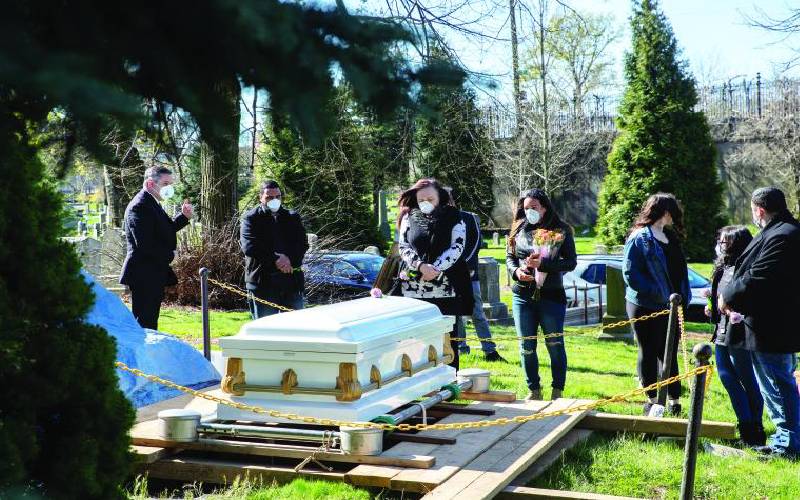
Mourners attend a funeral at the Green-Wood Cemetery during the coronavirus pandemic in New York City. [Reuters]
Burial of patients who die of coronavirus should be conducted by the family members under the supervision of health officials.
Also, the bodies should be placed in two body bags, which can then be put in a casket for burial, according to guidelines issued by the Ministry of Health for the safe disposal of bodies of Covid-19 victims.
The protocols forbid relatives from touching or kissing the body. Relatives and friends are allowed to conduct the burial but only under the watch of public health officials.
Religious and cultural burial practices are permitted as long as they do not involve contact with the body.
“The disposal of human remains from Covid-19 cases should be overseen by a public health official within two days (48 hours) to avoid community practices that would result in more infections through contact,” state the protocols titled Interim Guidelines on Handling of Human Remains infected with Covid-19 in Kenya.
All mortuaries
The document is meant to guide all mortuaries, both public and private
The health worker present during the burial of a Covid-19 victim must ensure that the casket is handled using personal protective equipment at all time.
The body must not be opened for viewing thereafter. Once bagged, it must be clearly labelled ‘infectious substance.’
The guidelines, which the ministry used to defend the manner in which the body of James Onyango was disposed of in Siaya County, shows that the State may have contravened its own rules.
A video of Onyango's burial that generated public outrage showed his wrapped-up body hurriedly dropped into the grave by two health officials dressed in white protective suits in the wee hours of the morning, as his family wailed from a distance.
The guidelines, prepared by Health ministry's acting Director General Patrick Amoth, gives step-by-step guide on how the bodies should be handled from death at a health facility to burial.
Step by step
The body should be packed inside two leak-proof and tamper-proof body bags.
Once the body bags have been wrapped, they must not be opened. The outermost body bag must be wiped with 0.5 per cent sodium hypochlorite (disinfectant).
The ministry has forbidden embalming to avoid excessive manipulation of the body.
“The body must be disposed of or buried by the family as soon as possible under supervision of the Health Care Provider, the local healthcare committee leader and religious leader,” the guidelines state.
Personnel handling the bodies must use facial protection such as face shields, goggles and medical masks and seal all body fluid leaks.
The ministry also requires that the movement and handling of the body be reduced to a minimum. Adults aged 60 and above and persons with weakened immunity are forbidden from directly interacting with the body.
Every item that comes into contact with the body or the body bag, or any material used to handle the body, including the stretcher, the gloves, or any part of the PPE, must be disinfected with sodium hypochlorite.
Viewing of bodies of Covid-19 victims in the mortuary before it is transported for burial is forbidden. Instead, relatives can identify their loved ones' body using digital means; photos of the face and other identifiers. This must be done outside the mortuary.
Postmortem is not mandatory and can only be allowed under unique circumstances with authorisation from a government pathologist.
The postmortem should then be carried out using minimal invasive procedures, with the body examined while still inside the body bag.
 The Standard Group Plc is a multi-media organization with investments in media
platforms spanning newspaper print
operations, television, radio broadcasting, digital and online services. The
Standard Group is recognized as a
leading multi-media house in Kenya with a key influence in matters of national
and international interest.
The Standard Group Plc is a multi-media organization with investments in media
platforms spanning newspaper print
operations, television, radio broadcasting, digital and online services. The
Standard Group is recognized as a
leading multi-media house in Kenya with a key influence in matters of national
and international interest.











